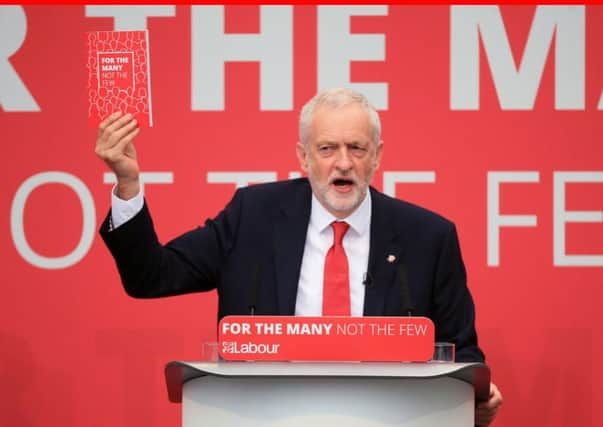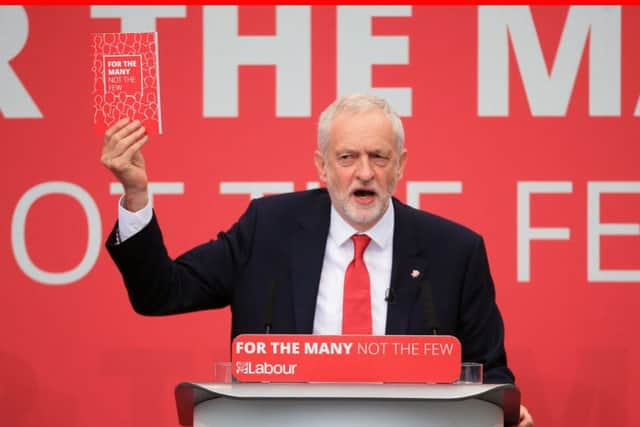General Election2017


Businesses and the top 5 per cent of earners will bear the burden of paying for a major expansion in public spending, growing the size of the state to its largest level in 70 years.
Labour will also impose new taxes on “excessive” pay, private school fees, and homes bought by trusts registered in offshore tax havens to raise £48.6bn. New borrowing worth £250bn over ten years will be invested in infrastructure such as roads, railways and broadband to “upgrade” the UK economy.
Advertisement
Hide AdAdvertisement
Hide AdMr Corbyn’s young supporters will get Labour’s biggest single giveaway if he becomes Prime Minister, with £11.2bn dedicated to abolishing tuition fees and reinstating maintenance grants for students.


The pledge is worth twice as much as a proposed £5bn increase in NHS spending, and five times the amount promised to relax the Conservative freeze on benefits.
Mr Corbyn also promised to raise the minimum wage to £10 per hour and keep pensions rising faster than wages and inflation. The Scottish Government will get a Barnett Formula windfall of at least £3bn. However, Labour did not provide detailed costs for a plan to nationalise railways, the Royal Mail and parts of the energy industry.
Labour rejected the legacy of New Labour and instead invoked Harold Wilson, launching its manifesto at the University of Bradford, where the former prime minister was chancellor, in a modern building he inaugurated.
Mr Corbyn said Labour’s plans would “change our country while managing within our means”.


“For seven years the Conservatives have been holding Britain back,” the Labour leader said. “Low investment, low wages, low growth. Labour will move Britain forward with ambitious plans to unlock the country’s potential.”
Answering questions from journalists, Mr Corbyn rejected claims that his tax-and-spend agenda was outdated.
“The other major party contending this election is really, really forward-looking: they are going to bring back fox hunting and grammar schools. That sounds really 21st century, doesn’t it?”
Advertisement
Hide AdAdvertisement
Hide AdScottish Labour leader Kezia Dugdale, who joined most of the shadow cabinet flanking Mr Corbyn on stage, said the manifesto was “a radical vision for a country that works for the many, not just a privileged few”.
But other senior Labour figures were less enthusiastic, with the shadow defence secretary Nia Griffith passed up an invitation in favour of campaigning in her constituency, having previously clashed with Mr Corbyn over his stance on Trident nuclear weapons.
The manifesto was dismissed as a “shambles” by the Conservatives, and respected think tanks questioned the figures at the heart of Labour plan.
The Institute for Fiscal Studies (IFS) said that Labour’s plans would see individuals and firms taxed more than at any point since the 1950s. But its analysis also warned it was “highly uncertain” that income tax rises would bring in the £6.4bn that Labour expects.
In its own financial breakdown, Labour admitted that revenues could fall short of projections. The party also factored in a £3.9bn drop in tax receipts to take account of “behavioural change” from people reducing or disguising earnings to avoid a higher tax bill.
The IFS said: “The tax revenue that Labour’s proposal would raise is highly uncertain. If no-one changes their behaviour in response, it would raise around £7 billion per year. But some of those affected would respond by reducing their taxable incomes, reducing the amount raised.”
Using a different calculations, the Resolution Foundation think tank said government receipts as a share of GDP rise to 39.2 per cent under Labour’s plans - the highest since 1984-5.
Resolution Foundation director Torsten Bell said: “Rather than getting our calculators out, we should really be debating the desirability or otherwise of a larger state.”
Advertisement
Hide AdAdvertisement
Hide AdAround 1.3 million people will be hit by the changes to income tax. Chief Secretary to the Treasury David Gauke called the manifesto a “shambles” and said the plans weren’t worth the risk to the economy.